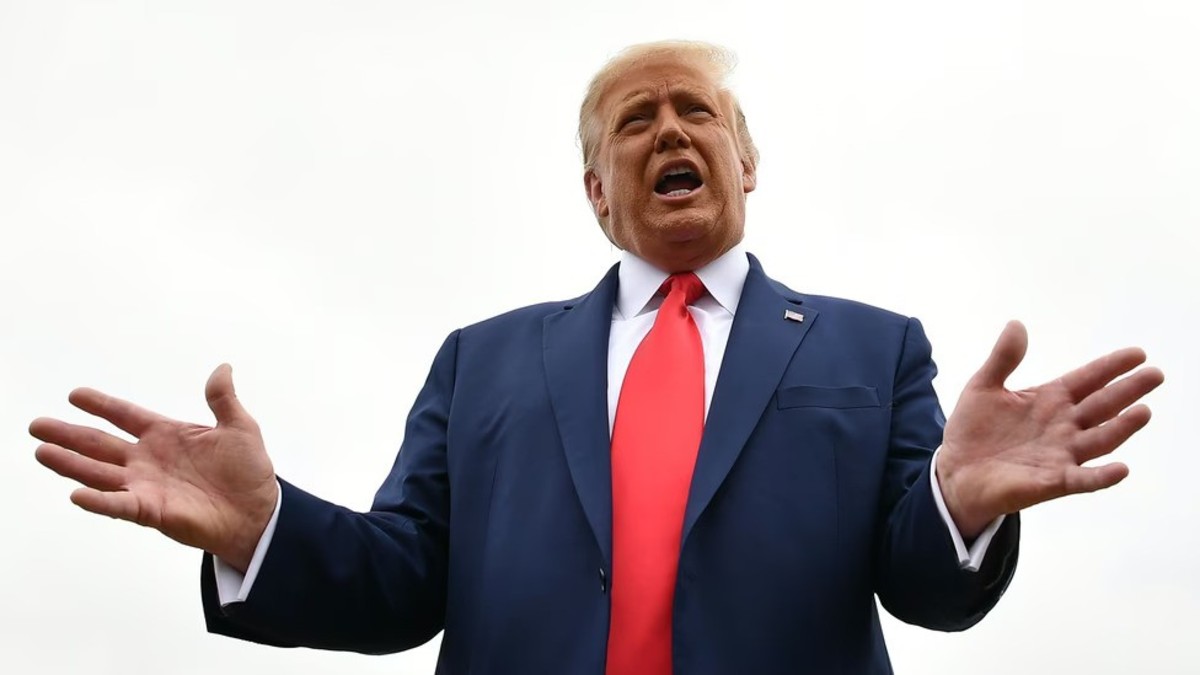I am going to begin this column with a joke. A man was being beaten in the public square of a town, but the more he was beaten, the more he kept laughing. Finally, someone watching the proceedings asked him why he was laughing. The man answered: “These people are beating me because they think I am Dhiru. But I am actually Viru.”
The joke may sound facetious, but it is both an illustration of the essence of Vedantic wisdom—that you are not what you (or others) think you are, Tat tvam asi—and of the principle that it is futile to beat the wrong person!
My worry is that, in our reaction to Donald Trump’s (DT) tantrums, we may lose sight of the fact that India has diplomatic relations with the United States of America, and not with a transient individual who will, within the next two years hopefully, become part of a short chapter of history that both Indians and Americans may wish to forget.
I accept that it is tempting in today’s age of 24-hour news cycles and Twitter-driven diplomacy to see history through the narrow prism of personality. But to reduce Indo-American ties to the temperament of one man is to profoundly misread both the long arc of history and the deeper convergences that bind the world’s oldest democracy with its largest.
India and the United States are bound not merely by trade statistics or transient political postures. They are linked, at a deeper level, by a civilisational affinity that transcends regimes, rhetoric, and rogue leaders. This is not to deny the reality of immediate irritants—especially around trade imbalances, technology transfer, and intellectual property disputes—but to place them in their proper context: as negotiable issues within a long-term, strategic relationship.
Impact Shorts
More ShortsTrump, in the grand sweep of India–US relations, is, in my view, a transient nuisance, a temporary disruptor, not a permanent roadblock; an aberration, not an irrevocable defining force for all time. His leadership style is at odds with the strategic patience that true diplomacy demands. He has reduced alliances to balance sheets, and friends to negotiable assets. Yet, despite his provocations, the structural foundations of the India–US partnership remain intact. Defence cooperation expanded, foundational agreements like BECA and COMCASA were signed, and strategic dialogues deepened. That such progress occurred even during Trump’s erratic presidency is testimony to the resilience of the relationship.
The goal of our diplomacy then must be not to throw the baby—which is the long-term perspective of Indo–American relations—out with the bathwater of a notoriously eccentric and unstable individual. How we do this will be the real test of our diplomacy.
There are two aspects to this. First, our reaction to his unpredictable and often obnoxious behaviour. This should be responded to not with emotionalism but with a firmness infused with dignity, self-esteem and strategic autonomy. Dignity, because that befits our civilisational ethos; self-esteem, because we are not a pushover, nor are we at his mercy; and, above all, strategic autonomy because, as a sovereign nation, we shall not be dictated to by anyone—however powerful he may think he is—in deciding how we conduct our foreign policy and the choices we make in our national interest.
Second, we should, through this temporary squall, continue to focus on the long-term convergences and mutually beneficial dividends that are the foundation of Indo–American relations. A substantive India–US trade agreement has long been awaited. Both countries have much to gain. The US is India’s largest trading partner in goods and services, and India is a rising economic power with a rapidly growing consumer base and a sophisticated IT and pharma sector.
A comprehensive agreement could address tariff barriers, ease investment flows, unlock supply chains, and enhance collaboration in sectors such as defence, hi-tech, clean energy, digital services, and healthcare. There may be Trump-engineered setbacks to such an agreement—including news even as I write this of even higher tariffs—but the conclusion of a trade deal must remain one of our pivotal goals.
We should also focus on our strengths within the US. In contemporary times, the Indian-American diaspora—now over 4.5 million strong—serves as a living bridge. It is a community that excels in business, medicine, technology, and politics. From Silicon Valley boardrooms to Capitol Hill chambers, the Indian-American presence affirms the compatibility—and complementarity—of our two democracies. There are geopolitical synergies as well, given the relentless Chinese pursuit of hegemony in the Pacific region and elsewhere.
Perhaps the senseless arbitrariness of Trump should make us smell the coffee, and put our own house in order. We need to diversify our trade markets, negotiate new destinations for our goods, and reduce dependence on any one country for our critical needs. We also need to do far more on the Ease of Doing Business arena, and make our economy more competitive, while continuing to upgrade our military infrastructure.
Trump will come and go, but India must emerge stronger and more dynamic at the end of it.
The writer is a former diplomat, an author, and a politician. Views expressed in the above piece are personal and solely those of the author. They do not necessarily reflect Firstpost’s views.


)

)
)
)
)
)
)
)
)



